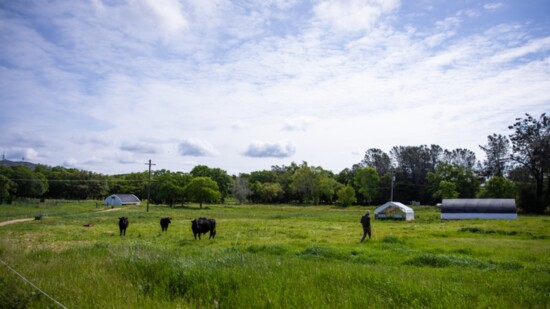Inspiration came in the form of a weed-choked abandoned golf course, a bounding buff-colored Labrador retriever named Sonny, and a desire to share local, healthy food with the surrounding community. With that, Sonny’s Farm was born in 2019.
It’s a sweet story. The farm’s founding family wanted to give Sonny what every dog deserves: wind in his ears, rich soil beneath his paws, and nourishing energy straight from nature. Not only for Sonny but for all the animals in their herds and flocks. Their overall mission was to improve the practices—and products—of conventional farming and to raise highly nutritious meat, poultry, and eggs through environmentally responsible and sustainable methods. So, they brought in goats to eat down the weedscape, got to work planting native mixed-cover crops, and began adding livestock.
Spanning 140 acres of nutrient-dense land off Alexandrite Road in Rescue, on the site of the former Bass Lake Golf Course, Sonny’s Farm raises animals using regenerative methods. With approximately 75 head of cattle, 35 pigs (a mix of Berkshire, Hampshire, and Red Wattle), some sheep, and about 900 chickens (including layers and broilers), Sonny’s spreads across carefully managed foothill land that overlooks the Sacramento Valley.
Through the use of holistic farming techniques such as cover cropping, no-till planting, and rotational grazing—the animals are moved daily—the people at Sonny’s Farm take soil integrity seriously. After all, nutrients in the soil grow strong plants that feed healthy animals.
Sonny’s uses an individualized approach to its farm management in both its locations. (A second location in Crestview, Florida opened in 2021.) What works best in dry-climate Northern California foothills might not work as well in humid Florida, where every day at 4:30 p.m., it rains, according to one farm manager. It also depends on the animals’ activities, which the farm depends on for soil stimulation and fertilization. For example, the soil in Rescue is very compact, and pigs are natural tillers. With their snouts and hooves, and in constant grunting competition with each other at their troughs, they push and shove and root around. This promotes soil aeration and disturbs ancient seed beds. Their natural fertilizer adds to the mix. A paddock where pigs rummaged a few weeks ago—after it’s left to rest and been reseeded (with a diverse blend of perennial grasses such as fescue, rye, brome, and clover)—will grow thick tangles of deep green grasses perfect for nourishing the animals who follow.
Then there’s the “egg mobile,” an on-the-move enclosure for the chickens—they can pop out through an opening, similar to a doggy door, to peck and scratch and nibble in the sunshine. In the rotation, the chickens follow the cows. It’s a symbiotic relationship that helps with pest control. From the cow pies, the chickens eat the eggs and larvae of worms and flies. Their claws and beaks also help distribute the cow manure. After the “egg mobile” comes through, this land, too, sprouts brilliant green grass, vibrant and nutrient-dense food for the next rotation. Also, pigs and chickens are fed no corn, soy, or anything genetically modified, and the cattle and sheep eat exclusively grass and organic hay. None of them receive artificial hormones or antibiotics.
With the global challenge of access to healthy food, Sonny’s Farm provides a sustainable solution in our local community. Beyond sustainability, regenerative farming is about restoring ecosystems and soil health. With an approach that begins with asking, “What’s the best outcome and how can we get there?” The owners and managers of Sonny’s Farm have been inspired by leaders in the regenerative farm industry—including renowned farmer Joel Salatin.
This past spring, time and weather permitting, the Rescue location of Sonny’s Farm has run public tours ($15 per adult) to introduce the farm and its practices to neighbors and customers. Wandering the meandering path that once carried golf carts, tour-goers ooh and ah at the oak-studded landscape, where mama cows and just-born calves lounge in deep shade, where baby piglets run and squeal in grass higher than their heads, where a pretty pond the size of a small lake ripples beneath a swan whose two babies paddle behind her. The tours have ended for the season, but interested people should check Sonny’s Farm’s social media for announcements about future tours and events.
Customers can visit the farm shop, open 10 a.m.– 5 p.m., five days a week (Monday–Wednesday, Friday and Saturday) for pastured eggs and chicken, a multitude of sausages, grass-fed beef and lamb, and possibly some organ meats, bones and fat. Products also can be ordered online at sonnyfarm.com, for pickup or shipping. Patrons who visit might be greeted by Xyla, the friendly white shepherd, or perhaps, by Sonny himself.
Sonny’s Farm is located at 3000 Alexandrite Road, Rescue
sonnysfarm.com
@sonnys.farm
With the global challenge of access to healthy food, Sonny’s Farm provides a sustainable solution in our local community.
Their overall mission was to improve the practices—and products—of conventional farming and to raise highly nutritious meat, poultry, and eggs through environmentally responsible and sustainable methods.
